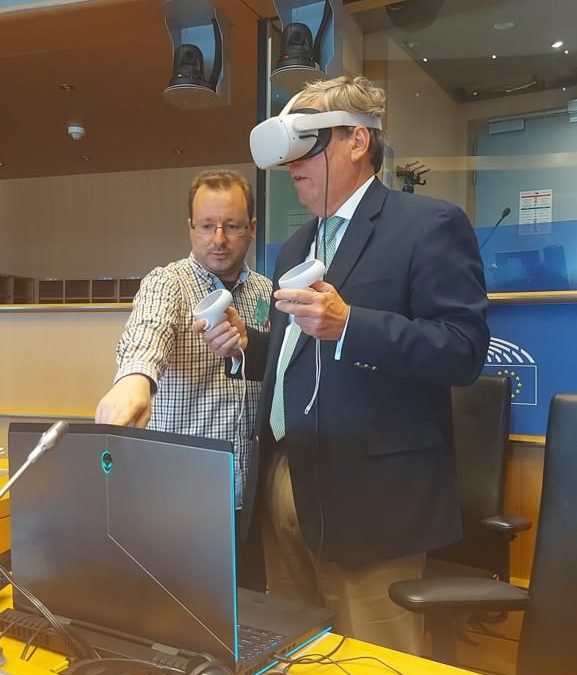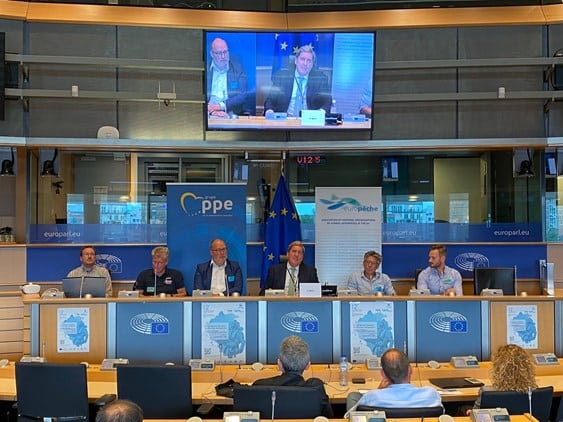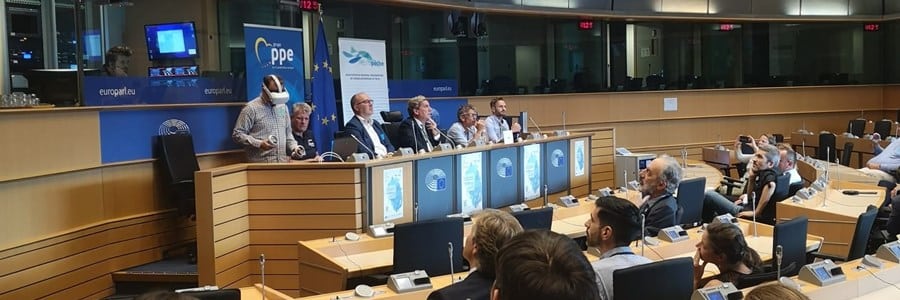A consortium of EU fisheries experts together with the Member of the European Parliament (MEP), Mr Gabriel Mato, co-hosted a successful event to present a virtual reality simulator for maritime emergencies. The event brought together a wide range of fisheries stakeholders, including representatives of EU Institutions, industry and civil society that appreciated the innovative tool. The 3D training course accessible through a Virtual Reality kit is now publicly available to better face maritime emergency situations on board, decrease accidents and fatalities at sea and digitize the sector. This tool and training programme are the successful result of collaboration between the sector, safety specialist, training providers and IT experts.
Building on almost three years of close collaboration and cooperation, Europêche and the partner organisations have pooled their expertise to pioneer a new learning tool to better prepare crews for maritime emergencies. The digital programme will help better instruct fishers on the hazards involved in fishing operations and the procedures to follow in case of emergency. The implementation of these measures would certainly help minimizing accidents and fatalities at sea.

MEP Gabriel Mato praised the innovative tool and highlighted the value of this event for the European fishing sector, stating: “A sustainable Common Fisheries Policy must guarantee the protection of the marine environment and of fishermen alike. Safety at sea is therefore vital and everyone’s responsibility. As legislators, we should spare no effort to prevent any accident from happening and ensure that our fishers operate under the best possible safety and working conditions. For this reason, I am honoured to host the presentation of this project which focuses on the protection and safety of our fishermen”.

Nicolas Le Berre, Maritime Institute for Prevention (IMP) and leading partner, presented in detail the 3D training course and how the Virtual Reality kit works. Mr Le Berre declared: “The fishing sector has changed. Fishermen are more and more eager to use new learning technologies and we need to provide them with the tools to be better prepared to face critical situations. Digital tools like the simulator we have developed are fundamental to ensure that our crews return safe and sound to their families after fishing”.
Cor Blonk, Chairman of the EU Social Dialogue Committee for Sea Fisheries, appreciated the efforts made by the European Parliament and Mr Mato to place “safety at sea” at the core of the Common Fisheries Policy. Mr Blonk declared: “The safety of human life must be at the forefront of EU legislation to ensure its protection as part of sustainable fishing. For this purpose, EU policies must be aligned with international standards on training and certification. It would be a huge step forward to bridge the existing legal gaps at EU level on harmonised vocational training and recognition of certificates”.
About the project https://vr-me.eu/
Most of the fatal accidents on board fishing vessels are due to lack of knowledge on devices and emergency procedures, and non-completion of periodic training exercises and simulations. To ensure a correct reaction by the fishing crew in emergency situations, trainings and simulations are needed where crewmen are exposed to a series of scenarios to get the procedures, and how to execute them.
VR-ME’s ultimate output is a training programme and Virtual Reality Simulator for Maritime Emergencies on board fishing vessels. A very innovative tool non-existent in the industry that would bring the training in emergencies to a higher level. End users can download the software which is publicly available[1].
The end products have been developed by a project consortium made of six partners from five European countries with experience in vocational training, prevention of occupational hazards, IT and the sector: IMP (Maritime Institute for Prevention, France), ARVI (Shipowners Cooperative of Vigo, Spain), SGS TECNOS (world’s leading inspection, verification, testing and certification multinational company), SQLearn (IT developer, Greece), PFA (Pelagic Freezer-trawler Association) and Europêche (European Fisheries Association, Europe).
VR-ME is a project co-funded by the Erasmus+ Programme of the European Union.
Sources: Europêche






